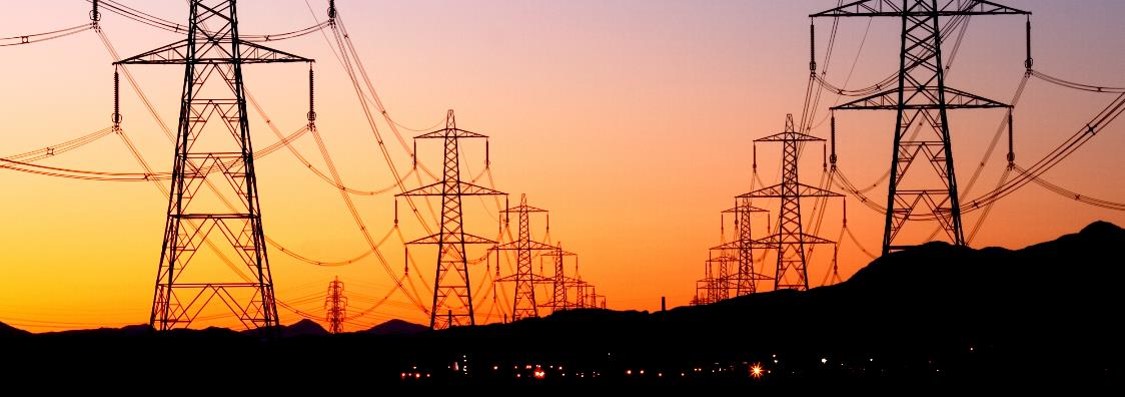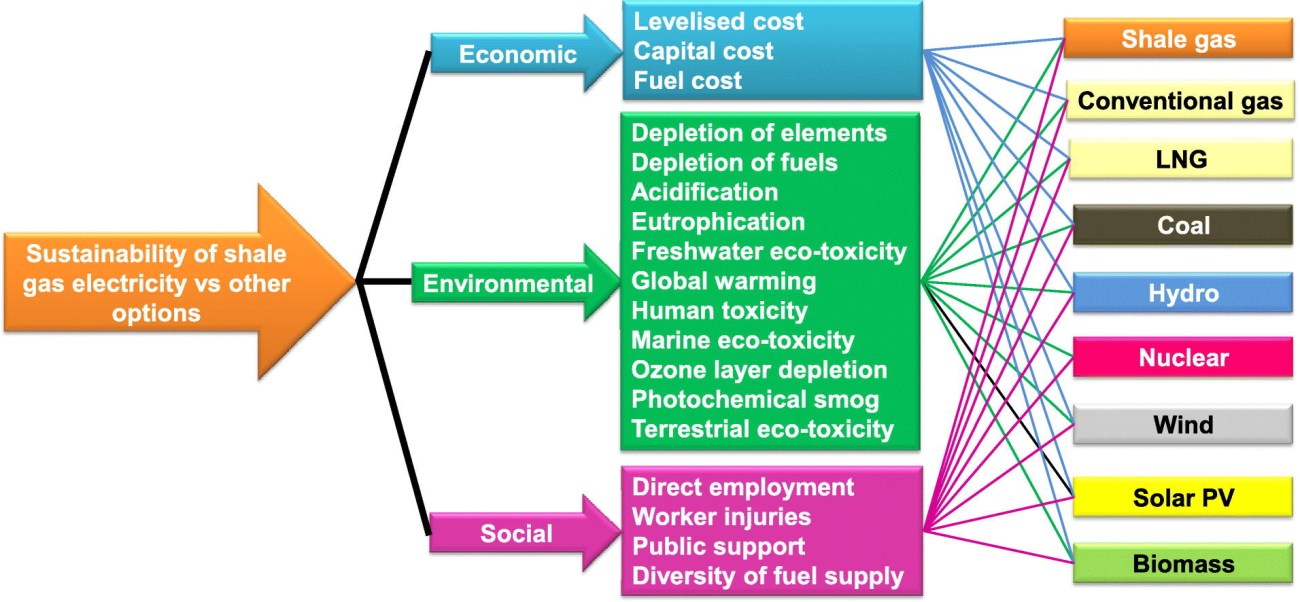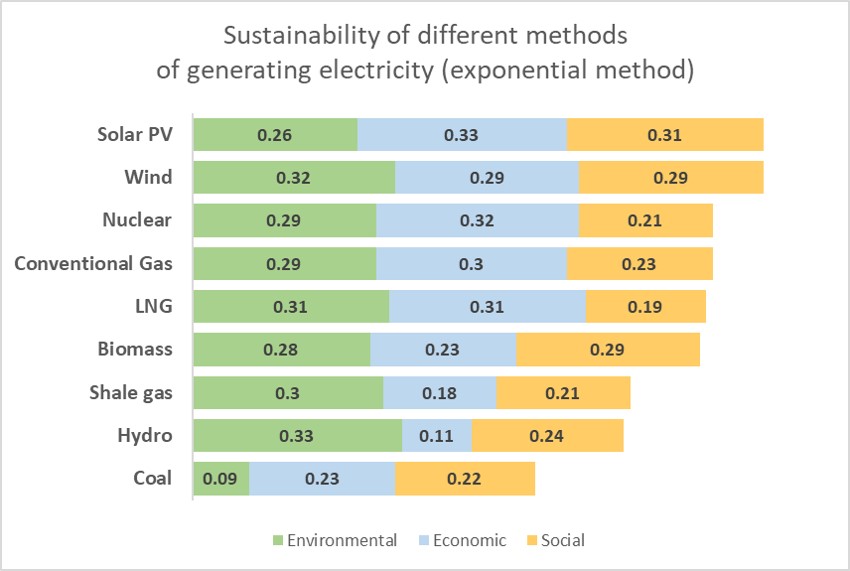
Photo: Brian Smith Licence
Research by scientists at Manchester University has found that shale gas is one of the least sustainable choices for generating electricity.
Their report, Sustainability of UK shale gas in comparison with other electricity options, looked at nine fuels, including shale gas, conventional gas, liquefied gas imports, coal, wind and solar.
Each was ranked against 18 sustainability indicators divided between economic, environmental and social impacts. Each indicator was weighted based on its relative importance in its group.
Assuming that the three groups were treated as equally important, the report ranked shale gas seventh out of the nine options for sustainable generation of electricity.

Groups, indicators and fuel sources Graphic: Total Science of the Environment
Co-author of the report, Professor Adisa Azapagic, said this was the first time that economic, environmental and social impacts of shale gas have been considered together. She said:
“This enables us to evaluate its overall sustainability rather than focusing on single issues, such as water pollution, traffic and noise, which have dominated the debate on shale gas so far.”

According to the report, published today in Science of the Total Environment, shale gas scored well on environmental measures, but fared badly on economic and social indicators.
It was assessed as having the lowest employment rate (47.7 person-years of employment per TWh generated, compared with 653 for Solar PV) and the lowest score on the public support index apart from coal.
The report studied how the rankings responded to changes in the relative importance of the three groups. It found that shale’s ranking never went above fourth whatever changes were made to the group weightings.
Shale would come out on top if it achieved a 70% improvement across all indicators, the report said. It could match the sustainability of conventional gas by reducing its production costs by 25%.
The report concluded that shale was generally “not one of the better options” for the sustainable generation of electricity. Scenarios could be developed where shale gas was the most sustainable fuel but they were not very realistic, the report said. Even matching the results for conventional gas, LNG and nuclear would require “large improvements in the performance of shale gas”.
“Serious flaws”
Ken Cronin chief executive of UKOOG, the body representing the onshore oil and gas industry, said of the report:
“The option of producing gas here with high environmental standards, compared to transporting gas halfway around the world from countries with lower environmental standards, has obvious environmental and economic benefits.
“When considering environmental aspects alone, the report shows that shale gas is more sustainable than solar. And published Environment Agency statistics show that onshore oil and gas is one of the best performing sectors in the UK when it comes to environmental performance.
“This report has a number of serious flaws.
“Firstly, it concentrates on electricity and ignores the 21 million homes that use gas for heating and the 500,000 jobs that are sustained using gas as a feedstock.
“Second, it assumes that electricity from LNG will cost less than shale gas, which is at odds with how the UK’s gas market works and shows a lack of understanding on the part of the authors.
“Third, it provides no data on the additional network and intermittency costs of options such as wind and solar.
“And fourth, the report does not provide its underlying economic assumptions, which we will only be able to determine once we have started exploring what is under our feet.”
The authors’ response
DrillOrDrop invited the report’s authors to respond to UKOOG’s criticism. They told us:
“Our paper does not consider the use of gas for heating but it is fair to say that the overall energy chain efficiency of using gas for heat is greater than that of using electricity for heat.
“However, we should also bear in mind that the heat sector is in need of rapid decarbonisation over the coming decades, and domestic heating does not lend itself to mitigation technologies like carbon capture. Consequently, shale gas has a quite narrow window of opportunity even in the heating sector.
“Regarding the environmental impacts of shale gas, it is correct that some impacts are higher for solar PV; however, the greenhouse gas emissions are five times higher for shale gas, together with some other impacts, than those for solar PV.
“Regarding the costs of shale gas, it is true that it is difficult to project costs before commercial extraction has started, but our estimates suggest that shale gas extraction will not be as cheap as some have speculated, and certainly not as cheap as it is in the USA.
“The point on intermittency is certainly fair but perhaps overstated given recent renewable cost developments.
“The last Contracts for Difference auction saw offshore wind project clear for £57.50/MWh, which is cheaper than the projected prices for new CCGTs (combined cycle gas turbines) which would be used to generate electricity from shale gas. “Similar rapid cost reductions are also occurring for solar power.
“In light of this, the total cost of renewables plus intermittency-mitigation (e.g. storage) might still be lower than, or comparable to, conventional CCGTs.”
Categories: Research

It is not about scoring points, PhilipP. That is a strange attitude to take.
If you continue to post factually incorrect information, I will point that out. It is a strange discussion where one party can just revert to incorrect statements and expect them not to be challenged. Try using the “down the pub” assessment.
OK, to call your bluff. I wouldn’t see the 20-25year guarantee on modern solar panels as calling for frequent renewal. What other manufactured items around your household can you point to with that kind of replacement cycle? and thats not to say they won’t go on being capable of producing around 80% of their potential output for many more years than that. Meanwhile why do you never fact check people like EKT who claims UK gas pads are going to be more productive than US ones? I thought you were about to challenge him on the basis of pure speculation earlier, but no. If you’ve got such a bee in your bonnet about ‘facts’ you could challenge EKT on his amazing story about 60 well pads (for the UK) with 4 mile laterals for each well. Now that would be amusing for everyone.
Strange; gas vs life of solar panels? Turn on the gas, light a match and phuff, the gas has gone ) leaving behind its contribution to global warming). Funny that.
Sherwulf
Yes, sustainability in the long run is not fossil fuel. The discussion now re peak oil is not when it runs out but when it gets replaced. But a fair way to go.😳
Reblogged this on Declaration Of Opinion.
Whilst the headlines are interesting, it is really worth reading the full paper and then the data source: “Environmental Impacts of Shale Gas in the UK: Current Situation and Future Scenarios” by Jasmin Cooper, Laurence Stamford, and Adisa Azapagic. This also reached some strong conclusions against Shale. I think it is worth noting that PV tech is moving so rapidly that impacts per unit of electricity generated are also being proportionately diluted though should not be ignored. Wind offshore and onshore has not been broken out in this report nor the various types of hydro or biomass. This is unfortunate as the indicators vary accordingly. “Life cycle assessment demonstrates environmental co-benefits and trade-offs of low-carbon electricity supply options” by Thomas Gibona, Anders Arvesena, Edgar G. Hertwich is a good one to drill into these specifics.If only the government had given wind the support it has given oil and gas we could have kickstarted a really worthwhile industry by now……
PhilipP-why would I fact check EKT and spoil your fun?? I don’t notice you fact checking too many other antis, and there is an awful lot to go at there. I realise the antis can do with all the help they can get (hence the high number of arrests) but sorry, count me out. I have a speculation phobia.
A phobia to such statements: “Regarding the costs of shale gas, it is true that it is difficult to project costs before commercial extraction has started, but our estimates suggest that shale gas extraction will not be as cheap as some have speculated, and certainly not as cheap as it is in USA.”
For difficult, read impossible, that means estimates are total guesswork, and the rest then is nonsensical speculation trying to support a “scientific” assessment. Sorry, to me, “scientific” has a different meaning.
Martin … I challenged you on your criticism: “If you continue to post factually incorrect information, I will point that out. ” …. and I answered the only possible point that you appeared to claim was factually incorrect. Then you went off on another sidetrack. Without backing up your (tiresomely) repeated ‘factually incorrect’ criticism, and in the interests of keeping this a blather-free zone, would you please stick to the point. Find something that is factually incorrect that I have stated on this thread and we can argue that point. Take your time … and please don’t give me this stuff about ‘you antis being all alike etc’, I can assure you we are all different and while I won’t get you to account for many of the bonkers and untrue claims of some of the other pro-frackers I would ask you to respect that, as individuals, we are all responsible for whatever arguments and observations we ourselves choose to make. The group labeling is just a cheap trick and should be beneath the standards of this site (though the boundaries of free speech are inevitably hard to manage).
Reblogged this on SEO.